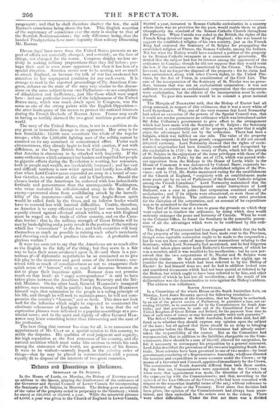Eleven days' later news from the United States presents an
as- pect of affairs not materially changed, and certainly, on the face of things, not changed for the worse. Congress display no less ac- tivity in making military preparations than they did before ; per- haps their zeal is even more apparent ; but then it has less of a special direction. America seems now to be arming, not so much to attack England, as because the talk of war has awakened her attention to her unprepared condition for any such event. It is strange to read in the reported proceedings of the American Con- gress, debates on the state of the navy very similar to the discus- sions on the same subject in our own Parliament—to see complaints of dilapidation and inefficiency, just like those which were urged here : and one particular instance of the helplessness of the United States navy, which was much dwelt upon in Congress, was the same as one of the strong points with the English Opposition— the utter inadequacy of the means to protect the national interests during the French blockade of Buenos Ayres. France may exult in having so terribly alarmed the two great maritime powers of the world.
The navy of the United States, then, is not in a condition to do any great or immediate damage to an opponent. Her army is far less formidable : 12,000 men constitute the whole of the regular troops ; while the 1,200,000 fighting men of the militia cannot be counted on for any sustained or concentrated effort. Under such circumstances, they already begin to look with caution, if not with diffidence, at the large British force in Canada. 1I-at, however, that America is obnoxious to be attacked with impunity. If the same enthusiasm which animated her leaders and impelled her people to gigantic efforts during the Revolution is wanting, her resources, both in people and wealth, are incalculably increased ; and her vast and difficult territory is now wider spread and hardly less difficult than when Lord CORNWALLIS expended an army in a round of use- less victories, to surrender at the end in Charleston. Should the chosen leader of the Americans be endowed with less indomitable fortitude and perseverance than the unconquerable Washington, who twice recruited his self-disbanded army in the face of the enemy—protected alone from annihilating attack by the incredi- bility of the manoeuvre—still, men of true Anglo-Saxon spirit would be called forth by the times, and an inferior leader would have to contend less with internal difficulties. Unable, therefore, as America is to carry effectual war beyond her own bounds, and equally closed against effectual attack within, a war with England must be waged on the trade of either country, and on the Cana- dian border : that is, the military strength of Great Britain will be met by bush-fighting and a petty revolt in the portion of the territory which lies "convenient " to the foe ; and both countries will busy themselves as much as possible in ruining each other's merchants and throwing each other's produce into the sea. A profitable and glorious warfare !
It were too soon yet to say that the Americans are as much alive as the English to the folly of the thing; but they seem in a fair way to have their sense awakened upon it, if—and there is a por- tentous if—if diplomatic negotiations be so conducted as to give fair play to the acuteness and good sense of the Americans ; con- trived with so much of conciliatoriness as not to exasperate their quick sense of " honour," with so much of decorous firmness as not to pique their imperious spirit. Rumour does not promise much on that head: an " angry correspondence " is said to have taken place between the American Foreign Secretary and the Bri- tish Minister. On the other hand, General HARRISON'S inaugural address, says rumour, will be pacific ; but then, General HARRISON himself says, that submission to the people is a ruling principle of his life, and though he will seek to maintain peace, he will not com- promise the country's " honour," and so forth. This does not look well for the influence which might be expected to counteract the obstinate vehemence of Lockport mobs. It is true that the ad captandum phrases were delivered to a popular assemblage at a pro- vincial town ; and in the quiet and dignity of office General HAR- lusoN may learn something better than timeserving and the cant of his profession.
The best thing that rumour has done for all, is to announce the appointment of Mr. CLAY on a special mission to this country, to settle the disputes. His qualities of cool judgment and sagacity, his high reputation as the first statesman of his country, and the natural ambition which must make him anxious to retain his rank among the statesmen of the world, are guarantees of his fitness. It were to be wished—scarcely hoped, in the existing order of things—that he may be placed in communication with a person equally fit to dispose of the interests of two great countries.


























 Previous page
Previous page